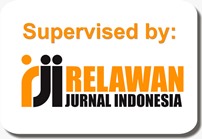THE ROLE OF WORK LIFE BALANCE, WORKPLACE DISCOMFORT BEHAVIOR, PSYCHOLOGICAL WELL BEING, AND EMPLOYEE ASSISTANCE PROGRAM ON JOB SATISFACTION
Abstract
Full Text:
PDFReferences
Abdullah, H., Kabia, S. K., & Pandey, P. (2022). Impact Of Work Life Balance On Job Satisfaction: A Study Of Chhattisgarh. Journal of Positive School Psychology, 6(8), 126–135.
Aden, R. A. (2015). HUBUNGAN ANTARA PSYCHOLOGICAL WELL BEING (KESEJAHTERAAN PSIKOLOGI) DENGAN KEPUASAN KERJA PADA PNS DINAS SOSIAL PROVINSI LAMPUNG. Universitas Bhayangkara Jakarta Raya.
Anh, N. T. H., & Tri, C. M. (2022). The impact of work-life balance on job satisfaction, organizational pride and commitment: A study in the service industry. HO CHI MINH CITY OPEN UNIVERSITY JOURNAL OF SCIENCE-ECONOMICS AND BUSINESS ADMINISTRATION, 12(2), 139–152.
Asgarian, A., Abbasinia, M., Sadeghi, R., Moadab, F., Asayesh, H., Mohammadbeigi, A., Heshmati, F., & Mahdianpour, F. (2022). Relationship between effort–reward imbalance, job satisfaction, and intention to leave the profession among the medical staff of Qom University of Medical Sciences. Frontiers of Nursing, 9(1), 11–18.
Budiati, T., Suryaningsih, W., Umaroh, S., Poerwanto, B., Bakri, A., & Kurniawati, E. (2018). Antimicrobial activity of essential oil from Indonesian medicinal plants against food-borne pathogens. IOP Conference Series: Earth and Environmental Science, 207(1), 12036.
Cintantya, D., & Nurtjahjanti, H. (2020). Hubungan Antara Work-Life Balance Dengan Subjective Well-Being Pada Sopir Taksi Pt. Express Transindo Utama Tbk Di Jakarta. Jurnal Empati, 7(1), 339–344.
EXHAUSTION, M. R. O. F. E., & DAHRI, A. S. (2019). EFFECT OF WORKPLACE INCIVILITY AND DESPOTIC LEADERSHIP ON JOB SATISFACTION.
Ganna, Q. N., & Sholichah, I. F. (2022). Pengaruh Kesejahteraan Psikologis (Psychological Well-Being) Terhadap Kepuasan Kerja (Job Satisfaction) Pada Karyawan PT. X. Jurnal Pendidikan Dan Konseling (JPDK), 4(4), 6033–6039.
Haar, J. M., Russo, M., Suñe, A., & Ollier-Malaterre, A. (2014). Outcomes of work-life balance on job satisfaction, life satisfaction and mental health: A study across seven cultures. Journal of Vocational Behavior, 85(3). https://doi.org/10.1016/j.jvb.2014.08.010
Handoyo, S., Syarifah, D., & Suhariadi, F. (2018). The measurement of workplace incivility in Indonesia: evidence and construct validity. Psychology Research and Behavior Management, 11, 217.
Hardianto, Y., & Islamiati, N. (2021). Hubungan Psychological well-being dengan Kepuasan Kerja pada Tenaga Kesehatan Honorer Puskesmas Mangunjaya Kabupaten Pangandaran. JURNAL PENELITIAN PENDIDIKAN, PSIKOLOGI DAN KESEHATAN (J-P3K), 2(3), 301–309.
Haryono, D. H. (2020). Pengaruh Workplace Incivility pada Job Satisfaction dan Turnover Inventions (Studi pada PT. Indomobil Nissan Datsun Surakarta, Yogyakarta dan Magelang). MRM (Media Riset Manajemen), 3(1), 13–24.
Hebbar, C. K. (2022). IMPACT OF WORK-LIFE BALANCE ON JOB SATISFACTION OF HOSPITAL NURSES-A CASE STUDY. EPRA International Journal of Multidisciplinary Research (IJMR), 8(4), 183–187.
Kinaseh, P. (2021). Hubungan Antara Psychological Well Being Dengan Kepuasan Kerja Pada Karyawan Kontrak Di Daerah Istimewa Yogyakarta. Universitas Mercu Buana Yogyakarta.
Lumunon, R. R., Sendow, G. M., & Uhing, Y. (2019). Pengaruh Work Life Balance, Kesehatan Kerja Dan Beban Kerja Terhadap Kepuasan Kerja Karyawan PT. Tirta Investama (Danone) AQUA Airmadidi. Jurnal EMBA: Jurnal Riset Ekonomi, Manajemen, Bisnis Dan Akuntansi, 7(4).
Meutia, Z., & Mauliza, P. (2022). The Effect Of Work-Life Balance On Job Satisfaction: Literature Review. Jurnal Mantik, 5(4), 2508–2513.
Nurhadi, D. (2020). How to implement employee assistance programs in higher education: A literature review. Teknologi Dan Kejuruan: Jurnal Teknologi, Kejuruan, Dan Pengajarannya, 43(2), 106–118.
Pettifor, E., Harman-Jones, C., Harman-Jones, B., & Sarfraz, M. A. (2021). Work-life balance among junior doctors. British Journal of Medical Practitioners, 14(1), NA-NA.
Pranajaya, I. K. (2021). PENGARUH KETIDAKSOPANAN DI TEMPAT KERJA TERHADAP KEPUASAN KERJA (STUDI PADA KARYAWAN PT SAMITEX SEWON. UNIVERSITAS ATMA JAYA YOGYAKARTA.
Prasanthi, M. P. R., & Das, V. T. (2021). Work Life Balance a Strategic Tool for Job Satisfaction in Healthcare Sector-An Empirical Study.
Pratama, H. P., & Setiadi, I. K. (2021). Pengaruh Work Life Balance Terhadap Kepuasan Kerja Karyawan Milenial Perusahaan Startup di Jakarta. Business Management Analysis Journal (BMAJ), 4(2), 145–159.
Rachmanadya, K. A., & Handoyo, S. (2022). Pengaruh Workplace Incivility terhadap Kepuasan Kerja Karyawan Milenial dengan Kelelahan Emosional sebagai Variabel Mediator. Buletin Riset Psikologi Dan Kesehatan Mental (BRPKM), 2(1), 280–291.
Roche, A., Kostadinov, V., Cameron, J., Pidd, K., McEntee, A., & Duraisingam, V. (2018). The development and characteristics of Employee Assistance Programs around the globe. Journal of Workplace Behavioral Health, 33(3–4), 168–186.
Silaban, H., & Margaretha, M. (2021). The impact work-life balance toward job satisfaction and employee retention: Study of millennial employees in Bandung city, Indonesia. International Journal of Innovation and Economic Development, 7(3), 18–26.
Tasema, J. K. (2018). Hubungan antara Psychological Well Being dan Kepuasan Kerja pada Karyawan di Kantor X. Jurnal Maneksi, 7(1), 39–46.
Vaidya, S., Ambad, P., & Bhosle, S. (2018). Industry 4.0–a glimpse. Procedia Manufacturing, 20, 233–238.
Yarmmani, Y., Anindita, S. M., & Hasanati, M. (2021). Employee Assistance Programme (EAP): Layanan Organisasi dalam Mengurangi Stres Karyawan pada Masa Pandemi COVID-19. UNUSIA CONFERENCE, 1(1), 55–76.
Zheng, X., Zhu, W., Zhao, H., & Zhang, C. (2015). Employee well‐being in organizations: Theoretical model, scale development, and cross‐cultural validation. Journal of Organizational Behavior, 36(5), 621–644.
DOI: https://doi.org/10.31846/jae.v11i2.660
Refbacks
- There are currently no refbacks.

This work is licensed under a Creative Commons Attribution-NonCommercial-NoDerivatives 4.0 International License.
e-Jurnal Apresiasi Ekonnomi Indexed by:












